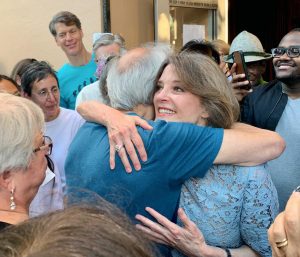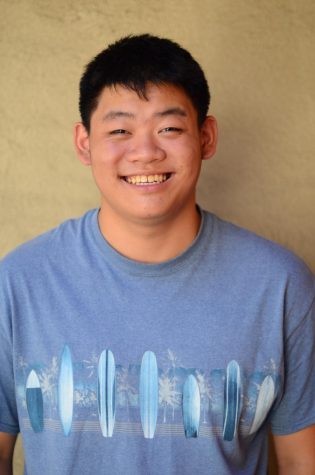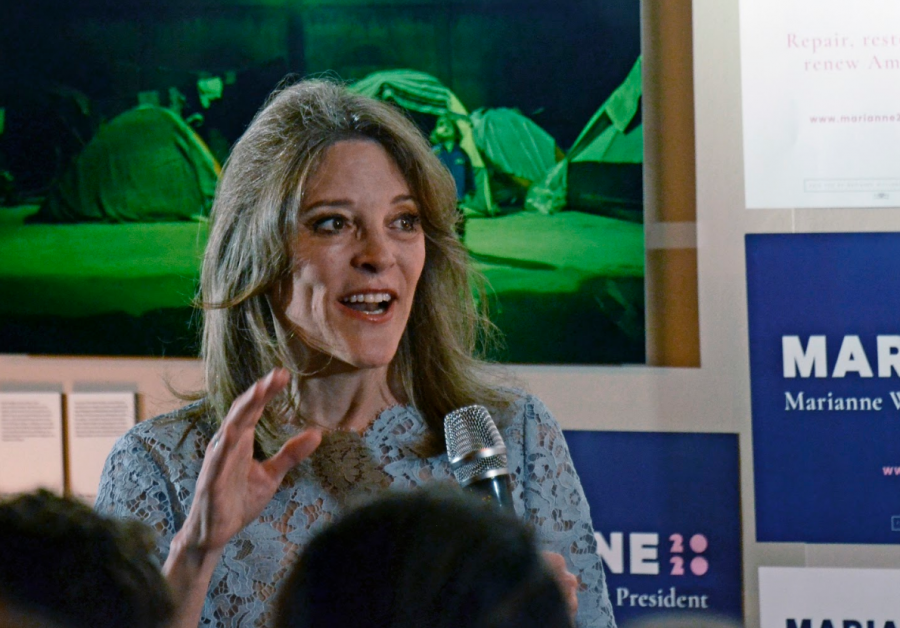‘Repair, restore and renew America’: Presidential candidate Marianne Williamson brings her vision to the Bay Area
Presidential candidate Marianne Williamson spoke to a crowd of over 300 people at Manny’s in San Francisco last night as part of her four-day campaign swing in California this week. Williamson’s plans to “repair, restore and renew” the country included reparations to African Americans and Native Americans and investments in the nation’s children.
Over 300 people gathered for a town hall meeting in the restaurant and community space Manny’s in San Francisco on Thursday night. Some of the people fanned themselves with navy and pink “Marianne 2020” posters. Some had brought copies of Marianne Williamson’s books. Others wore bright pink hats inscribed with the Democratic presidential candidate’s name. All waited in anticipation of hearing Williamson speak at her first town hall in San Francisco thus far in her campaign.
When Williamson entered the room, the audience erupted in cheers. For the next 45 minutes, the self-help author, activist and spiritual advisor to Oprah Winfrey spoke about her vision to “repair, restore and renew America” to the San Francisco crowd.
While Williamson polled at close to one percent on RealClearPolitics.com this morning, which is below the two percent in four polls required to qualify for the third Democratic debate, the room overflowed with people. While Williamson lacks political experience compared to the other Democratic candidates and has been criticized for her previous stances on anti-vaccination, her emphasis on love and spirituality resonated with many across the nation, and in last night’s crowd.
Many in the audience cheered when she spoke on eradicating the country’s “darkness,” namely racism, sexism, xenophobia and the like.
“You can’t hit darkness with a baseball bat and expect to get rid of the darkness,” she said. “You have to turn on the light. […] You have to drown it out with a more powerful song. It’s not just a matter of we will do this with this policy or that with that policy, as important as those issues are.”
Under the “Issues” tab of Williamson’s campaign website are the words “The Issues Aren’t Always the Issue.” The candidate has said in previous Democratic presidential debates that policies and plans are not enough to heal the nation, but rather the moral fiber of the nation must change. In San Francisco, Williamson called for the public to “wake up” by being politically involved.
“Not only do you have to wake up in order to elect a Democrat, not only do you really have to wake up to elect me, you have to wake up and stay awake,” she said.
Her message extended to high school students as well. In an interview with Harker Aquila after the event, she urged high school students to become informed and engage with the election, whether it be through voting or volunteering.
“Learn. Read. Listen to the candidates, read up on the issues and then listen to your heart and do what you think is best in America,” she said.
The issues she did speak about at the event included reparations, creating a Department of Peace and reforming campaign finance. During the second Democratic presidential debate hosted by CNN on July 30, Williamson pledged $200 to $500 million dollars to paying reparations if she were elected president. In the same debate, she called any amount less than $100 million “an insult” to African Americans.
Following the second presidential debate, Williamson gained over 8,000 new followers on Twitter, bringing her to a total of 2.7 million followers. In comparison, frontrunner Sen. Elizabeth Warren of Massachusetts has 2.9 million followers. From Twitter, Williamson often reinforces her idea of combining spiritual morality with policy surrounding immigration or the economy.
“There’s a saying that every problem comes bearing its own solution & that’s true of America today,” Williamson tweeted. “We’ll heal by aligning our economics, domestic & international policies with an ethical core.”
Williamson’s stance on reparations appealed to attendee Horace Thomas, who supports both Democratic candidates Kirsten Gillibrand and Williamson for their stances on reparations. On her campaign website, Gillibrand pledges to establish a congressional committee dedicated to studying the implementation of reparations.
“She spoke wonderfully on bringing people together, you know, unity and justice for all,” he said.
Williamson also spoke extensively on social justice for Native Americans, speaking out against the Keystone Pipeline in South Dakota and other infringements on native land. As president, Williamson promised to strengthen tribal self-governance by allocating more funds to tribal infrastructure and education.
“You can’t have the future if you aren’t willing to clean the past,” she said. “That’s why we have to deal with this in terms of race. We also have to deal with it in terms of Native American justice.”
Williamson’s vision of a new America also includes improved conditions for children by addressing chronic trauma and investing in education. To that end, she proposed instituting a Department of Children and Youth targeting problems faced by children in areas ranging from job preparation to a reformed juvenile system. Williamson’s campaign first released the plan for a Department of Children and Youth on July 28, calling for the agency to work interdepartmentally with all of the “different government entities” that affect children’s lives.
In terms of foreign policy, Williamson advocated for creating a federal division called the Department of Peace, focused on international development, mediation and aid.
“Our national security program should be a robust partnership, a far more robust partnership between our defense and our people,” she said.
Williamson also emphasized the need for public funding of federal campaigns and reforming the current campaign finance system. Being less than 5,000 individual donors short from the 130,000 donor threshold, Williamson herself has yet to qualify for the third Democratic presidential debate, though she gained popularity from the first two debates. After the second presidential debate, Williamson became the most Googled presidential candidate in 49 states.
At this point, the majority of Williamson’s campaign donations come from small individual contributions. Although Williamson’s lack of political experience could be seen as a disadvantage in the larger presidential runoff, supporter Brenda Kelley appreciates Williamson’s outsider perspective. She hopes that Williamson would qualify for the third debate without relying on large donations.
“I want her to prove by what she’s doing that we don’t have to have this expensive system that drains money away from what we need, and what we need to do is just believe in the people,” she said. “If she can do it, then we all can do it after she gets elected.”

Williamson embraces a supporter after her speech. She will host another campaign event in Scotts Valley tonight and one in Santa Barbara tomorrow.
Williamson’s next stops on the campaign trail are in Scotts Valley tonight and Santa Barbara tomorrow. On Wednesday, she appeared at the East Bay Church of Religious Science in Oakland. Her campaign’s California state director Steven Band believed that her reception last night boded well for future events in the state.
“We would love to do SF again,” he said in an interview with Harker Aquila. “Seeing how much enthusiasm and support we have, we know we’re coming back to SF.”
Williamson will return to San Francisco on Aug. 23 to speak at the First Unitarian Universalist Church of San Francisco. The link to sign up for the event went live on her campaign website today.

Eric Fang (12) is the co-editor in chief of the Winged Post. This is his fourth year in Harker Journalism, and he hopes to hone his skills as both a writer...


















![“[Building nerf blasters] became this outlet of creativity for me that hasn't been matched by anything else. The process [of] making a build complete to your desire is such a painstakingly difficult process, but I've had to learn from [the skills needed from] soldering to proper painting. There's so many different options for everything, if you think about it, it exists. The best part is [that] if it doesn't exist, you can build it yourself," Ishaan Parate said.](https://harkeraquila.com/wp-content/uploads/2022/08/DSC_8149-900x604.jpg)




![“When I came into high school, I was ready to be a follower. But DECA was a game changer for me. It helped me overcome my fear of public speaking, and it's played such a major role in who I've become today. To be able to successfully lead a chapter of 150 students, an officer team and be one of the upperclassmen I once really admired is something I'm [really] proud of,” Anvitha Tummala ('21) said.](https://harkeraquila.com/wp-content/uploads/2021/07/Screen-Shot-2021-07-25-at-9.50.05-AM-900x594.png)







![“I think getting up in the morning and having a sense of purpose [is exciting]. I think without a certain amount of drive, life is kind of obsolete and mundane, and I think having that every single day is what makes each day unique and kind of makes life exciting,” Neymika Jain (12) said.](https://harkeraquila.com/wp-content/uploads/2017/06/Screen-Shot-2017-06-03-at-4.54.16-PM.png)








![“My slogan is ‘slow feet, don’t eat, and I’m hungry.’ You need to run fast to get where you are–you aren't going to get those championships if you aren't fast,” Angel Cervantes (12) said. “I want to do well in school on my tests and in track and win championships for my team. I live by that, [and] I can do that anywhere: in the classroom or on the field.”](https://harkeraquila.com/wp-content/uploads/2018/06/DSC5146-900x601.jpg)
![“[Volleyball has] taught me how to fall correctly, and another thing it taught is that you don’t have to be the best at something to be good at it. If you just hit the ball in a smart way, then it still scores points and you’re good at it. You could be a background player and still make a much bigger impact on the team than you would think,” Anya Gert (’20) said.](https://harkeraquila.com/wp-content/uploads/2020/06/AnnaGert_JinTuan_HoHPhotoEdited-600x900.jpeg)

![“I'm not nearly there yet, but [my confidence has] definitely been getting better since I was pretty shy and timid coming into Harker my freshman year. I know that there's a lot of people that are really confident in what they do, and I really admire them. Everyone's so driven and that has really pushed me to kind of try to find my own place in high school and be more confident,” Alyssa Huang (’20) said.](https://harkeraquila.com/wp-content/uploads/2020/06/AlyssaHuang_EmilyChen_HoHPhoto-900x749.jpeg)



